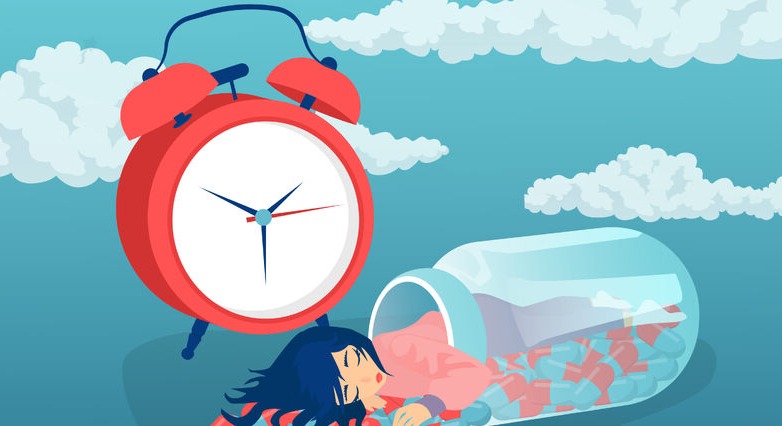Imoben It is a common sleeping pill for the short-term treatment of insomnia. This drug belongs to the "Z drugs" category and has a mechanism of action reminiscent of benzodiazepines, but is considered more innovative. Many are interested in it because it improves sleep quality and helps deal with frequent awakenings. However, it is important to understand the risks of prolonged use, the dosage options, and the safe way to gradually discontinue. In the following article, we will take an in-depth look at everything you need to know about Imovane, from the composition of the drug, through the possible side effects, to the aspects related to addiction and withdrawal.
What is Imovane?
Imovane, also known by the trade name Imovane, is a medication that helps to calm and induce sleep. The active ingredient in it is called Zopiclone. It is commonly attributed to the group of "Z drugs", because it is a series of drugs that are not benzodiazepines but share a similar mechanism of action.
This group Created out of a need to find Sleep medications Effectiveness, while exhibiting fewer side effects and dependence compared to older benzodiazepines. However, it is not without risks. According to most medical guidelines, it is recommended to use Imoben for a limited period of time only.
Zopiclone, the active ingredient in Imovane, binds to the same receptors in the brain that increase the activity of a substance that inhibits the central nervous system (GABA). This action leads to relaxation and a stronger tendency to fall asleep. The process is usually relatively quick, which is why many find Imovane an effective solution for sleep in temporary states of anxiety or stress.
What is Imoben used for?
Imovane is mainly used to treat difficulty falling asleep and multiple awakenings throughout the night. Many people suffer from frequent awakenings and are unable to sleep continuously for long periods of time. Others have difficulty falling asleep at the beginning of the night due to intrusive thoughts or stress. Imovane is a solution in these cases, although doctors emphasize that its use should be Short term.
- Treatment of short-term insomnia
Imoben is given in appropriate doses to provide a targeted response for a period of a few days or weeks. The dosage and duration of treatment are usually determined according to the severity of the condition and the age of the patient. - Aid in falling asleep
People who have difficulty falling asleep use Imoben to overcome the delay in the natural sleep process. The drug shortens the time it takes to fall asleep, therefore allowing for a faster entry into a deep sleep state. - Maintaining sleep continuity
In addition to helping you fall asleep, Imoben for Sleep also helps reduce multiple awakenings. This makes it possible to sleep better throughout the night. Usually, the guideline is not to use the medication for more than four consecutive weeks, in order to reduce the risks of dependence and the possibility of addiction.
Dosages and instructions for taking
Common dosages
- 3.75 mg (Imovane 3.75 mg): This is a starting dose for older or more sensitive patients. People over 65 are sometimes allowed to start at this dose because the body may react more strongly to sleeping medications.
- 7.5 mg (Imovane 7.5 mg / Imovane 7.5 mg): This is the most common dose in healthy adults. Many start with it when no particular sensitivity is suspected.
It should be remembered that the dosage is specific to the individual's medical condition. A doctor may recommend half a pill or a different dosage depending on the patient's response. In cases of severe anxiety attacks or prolonged sleep disturbances, sometimes consideration is given to adjusting the dosage or changing the type of treatment.
Starting dose and maximum dose
In most cases, The starting dose The recommended dose of Imovane is 7.5 mg before bedtime. However, in the elderly or patients with underlying diseases (kidney or liver problems), it is customary to start with a lower dose of 3.75 mg. This allows the body's response to be examined and reduces the risk of side effects such as dizziness or excessive fatigue the day after taking it.
The maximum dose usually does not exceed 7.5 mg at night for healthy adults. Increasing the dose beyond this is considered at least recommended, due to concerns about an increased risk of side effects and the development of dependence.
The importance of taking it near bedtime
Doctors emphasize the importance of taking Imoben immediately before going to bed. The reason is that it is recommended to ensure 7-8 hours of sleep to avoid feeling groggy during the day. When you take Imoben ahead of time, but don't get enough sleep, the "hangover" feelings may continue into the morning hours.
How long does it take for Imoben to take effect?
In most cases, Imoben takes effect within 30 minutes to an hour of taking it. Some patients feel drowsy within 20 minutes, but this depends on factors such as general health, weight, and individual sensitivity. However, you should avoid taking the medication if you do not intend to go to sleep immediately.
How long does Imuban stay in the body?
The half-life of Imovane is estimated to be about 5 hours, but there may be slight variations from person to person. In other words, after about 5 hours, the level of the drug in the blood drops to half of the initial amount. However, effects on the nervous system, including morning fatigue, can persist beyond this time – especially in patients who have taken a high dose or have not slept enough.
Side effects of Imoben
Most people take Imoben without experiencing any unusual side effects, but it's important to be aware of the possibilities. These effects range from mild and common, such as a bitter or metallic taste in the mouth, to more rare reactions that may require medical attention.
Common side effects
- Bitter or metallic taste in the mouth
Many people report an unpleasant aftertaste shortly after taking the pill. Sometimes this feeling persists the morning after. - Drowsiness the day after
Not getting enough sleep can make you feel tired during the day. This fatigue can impair your ability to drive or operate machinery. - dizziness
Some users complain of a feeling of dizziness. This phenomenon requires extreme caution when moving from sitting to standing. - Dry mouth
A familiar phenomenon that may be accompanied by persistent thirst. - Headaches
In most cases, this is a mild and transient pain, but it is worth paying attention to if it becomes chronic.
Less common or serious side effects
- Confusion and partial memory loss (amnesia)
It is rare, but it is possible for people to not remember actions they performed near the time they took the medication. - Unusual behavioral side effects
There have been isolated reports of unusual behavior, strange dreams, and even sleepwalking. In these situations, a doctor should be consulted. - Allergic reactions
In rare cases, the appearance of a rash, itching, or swelling around the mouth requires discontinuation of use and seeking medical attention.
Does Imoben cause drowsiness?
Yes, the purpose of the drug is to induce sleep and induce more continuous sleep. Similar to benzodiazepines, Imovane increases the activity of the substance GABA, thus reducing alertness and allowing the body and brain to enter a state of sleep more quickly.
Imoben addiction and withdrawal
Is Imoben addictive?
For years, it was believed that Z drugs (such as Imodium and Zolpidem) were safer in terms of addiction than benzodiazepines. However, In prolonged use Imoben may also cause physical and psychological dependence. Therefore, the general recommendation is to limit use to four weeks or less. Those who use Imoben for a long time may have difficulty falling asleep without the drug, and may even experience withdrawal symptoms if they try to stop suddenly.
Risks of physical and mental dependence
The longer you use Imoben, the greater the likelihood of developing dependence. Physical dependence is when the body becomes accustomed to the presence of the drug, so suddenly reducing the dose can cause negative reactions such as tremors and anxiety. Psychological dependence is associated with the feeling that you cannot fall asleep without the pill, even though there is not necessarily a physical dependence.
Imoben withdrawal symptoms
- Recurrent insomnia: People who return to having difficulty falling asleep or waking up frequently when treatment is suddenly stopped.
- anxiety: Worrying about not being able to sleep combined with withdrawal from the medication may increase anxiety.
- tremor: Some patients feel a slight tremor in their hands or body.
- Restlessness and irritabilityThese symptoms may appear in the first week of withdrawal.
The importance of gradual cessation and under medical supervision
To avoid severe withdrawal symptoms, it is recommended to stop using Imoben gradually. When asked how to stop Imoben, the correct answer is to reduce the dosage step by step, along with a doctor's guidance. For example, someone who was taking 7.5 mg every night could start by reducing to 3.75 mg, and later reduce to half a pill or take the pill intermittently. This way, the body gets used to the changes without a dramatic shock.
Interactions with other drugs and alcohol
Alcohol and Imovane
Combining alcohol with sleeping pills like Imovane is dangerous and strictly prohibited. The action of both substances together increases their depressant effect on the central nervous system. The result may be increased drowsiness, the risk of a dangerous drop in blood pressure, and worsening of breathing problems. Therefore, it is recommended to avoid drinking alcohol completely during treatment with Imovane (imovane and alcohol).
Interactions with other drugs
Other drugs that reduce central nervous system activity, such as benzodiazepine anti-anxiety drugs, certain antihistamines, or narcotic painkillers, may increase the depressant effect of Imovane. In addition, you should tell your doctor about any medications or dietary supplements you are taking before starting treatment with Imovane. Your doctor will be able to assess whether there are any increased risks from this combination.
Is Imoben dangerous?
Imoben is not dangerous when used according to the doctor's instructions and for a limited time. On the other hand, excessive use or combined use with alcohol or other depressants may lead to risky situations. In addition, taking Imoben for a longer period than recommended increases the risk of addiction and more serious side effects. Therefore, the answer to the question of whether Imoben is dangerous depends on the method of use. The fact that this is a drug that acts on the central nervous system should not be underestimated, and therefore great caution should be exercised.
Comparison of Imoben and other sleep medications
Imoben vs. Zolpidem (Ambien)
Zolpidem (Ambien) is another drug in the “Z-drug” group. It is also intended for the short-term treatment of insomnia. Although there are minor differences in chemical composition, the ultimate goal is similar – inducing sleep. Both substances have a similar side effect profile, including the potential for dependence and withdrawal (imovane vs. ambien). Sometimes the choice is made based on personal response or doctor’s guidance.
Imoben vs. benzodiazepines (e.g. Lorivan)
Lorazepam belongs to the benzodiazepine family, and is known as an anti-anxiety and sleep-promoting medication. Compared to benzodiazepines, Imoben is considered more focused on sleep induction and less on long-term anxiolytic effects. However, both can cause dependence with long-term treatment. People with anxiety may benefit more from Lorazepam, while those who prefer a direct sleep-inducing action with a short duration may use Imoben.
Frequently Asked Questions (FAQ)
Imoben during pregnancy and breastfeeding
Pregnant or breastfeeding women are advised to avoid taking Imovane unless specifically approved by their doctor. The effect on the fetus or nursing infant is not yet fully understood, so it is preferable to find natural alternatives or postpone drug treatment until after the pregnancy and breastfeeding period.
Imoben for children
In general, Imoben is not intended for children. The manufacturer emphasizes that caution should be exercised when administering the drug to young children, and that insomnia in children should be treated with behavioral methods or other therapies, unless a psychiatrist or neurologist recommends otherwise.
General Imoben
In pharmacy chains or health insurance company pharmacies such as "Clalit", Imoben can be obtained only by prescription. The prohibition of over-the-counter use is intended to prevent uncontrolled use and reduce the risks of addiction. The price of the drug may vary depending on the patient's insurance eligibility.
Imoben price
The price of Imoben is usually not very high, but it can vary between health insurance plans and private pharmacies. In addition, insured people may receive a discount or reimbursement under their medical insurance. It is worth checking with the pharmacy for the latest price or valid promotions.
Imoben half ball
Some people prefer to take half a pill (about 3.75 mg) in order to reduce side effects or to exercise caution when starting treatment. In any case, a doctor should be consulted regarding the decision to half a pill and adjust the dosage.
How long does Imoben take to work?
For most people, the effects last between 4 and 6 hours. However, side effects of drowsiness or lightheadedness can occur beyond this time window, especially if you don't get enough sleep or if the dose is too high.
Imoben for sleep
The term "Imovane for sleep" refers to the main purpose of the drug: helping you fall asleep and maintain regular sleep. It should be remembered that this is a spot treatment and not a permanent solution to long-term sleep problems. At the same time, it is recommended to work on a healthy sleep routine and relaxation techniques, in order to eventually stop relying on pills.
Imoben addiction
Long-term use of Imoben may lead to addiction, similar to other "Z-drug" sleep aids and traditional benzodiazepines. To reduce the risk, limit the duration of treatment and follow medical guidelines for gradual tapering.
Is Imoben addictive?
Yes, Imovane may be addictive with long-term use. Therefore, it is recommended to use it for a short period of time and consult a doctor about how to wean off if necessary.
How to stop taking Imoben?
The cessation should be gradual under medical supervision. The doctor may recommend a gradual reduction in dosage, until complete cessation. This can reduce withdrawal symptoms such as tremors, anxiety, and the return of insomnia.
Is Imoben dangerous?
Imoben is not dangerous when used according to medical instructions and for a limited period of time. However, excessive use or combination with alcohol may be dangerous. It is important to exercise caution and have periodic medical follow-up.
Additional tips for maintaining quality sleep
- Regular sleep routine: Make sure to go to bed at the same time every night.
- Avoiding screens later in the evening: The blue light emitted from phones and computers can inhibit natural melatonin production.
- Balanced diet: Avoid caffeine consumption in the evening and make sure to have a light meal before bed.
- Moderate physical activityRegular exercise contributes to better sleep, but it is recommended not to exercise late at night.
- Relaxation and breathing exercisesMeditation or deep breathing allows the body to enter a state of relaxation before sleep.
It is recommended to try these tips in conjunction with the use of any sleeping medication, as they support reducing drug dependence and help improve sleep in the long term.
Imovane for Anxiety – Does Imovane also help with anxiety?
There are reports of people using Imoben to help reduce anxiety symptoms, especially since anxiety can interfere with sleep. However, the drug is not officially classified as an anxiety treatment. Zopiclone is primarily aimed at sleep and not at treating other symptoms of anxiety disorders. Therefore, if the main concern is generalized anxiety, doctors may recommend a different treatment, such as CBT (cognitive behavioral therapy) or other medications.
Imovane vs Zopiclone – What’s the difference?
Imovane and Zopiclone are actually two names for the same active ingredient. "Imovane" is a brand name, while Zopiclone is the generic name. There may be different generic versions of the same drug on the drug market, under different trade names. The generic compounds are supposed to provide a similar effect, but sometimes patients feel a slight difference in the taste or the intensity of the side effects.
Imovane Withdrawal – The Withdrawal Process
Withdrawal from Imovane involves a gradual reduction in dosage under the guidance of a doctor. Some people experience some difficulty falling asleep or a feeling of restlessness in the first few weeks. However, others find the process easier through lifestyle changes and relaxation techniques. It should be remembered that the withdrawal process requires patience.
What is Imovane?
Imovane is a hypnotic drug designed to relieve people with insomnia. Its mechanism of action is similar to benzodiazepines, but the drug belongs to the "Z-drugs" group. Its purpose is to calm nervous activity and enable a regular night's sleep. Hence, its use should only be for a short time, to reduce the risk of addiction.
Imovane for Sleep – How does it work?
Imovane for sleep acts on the GABA-A receptor, which is responsible for regulating nervous activity in the brain. When the active ingredient, Zopiclone, binds to this receptor, the nervous system activity is calmed and helps you fall asleep. This effect is relatively rapid, which is why this medication is effective in cases of difficulty falling asleep.
Imovane Dosage – Guidelines
Imovane Dosage The usual dose is 7.5 mg for most adult patients. Elderly patients or people with complex health conditions sometimes start at 3.75 mg. However, the recommended dose should not be exceeded without medical approval. Overdosing increases the risk of side effects, including increased fatigue and cognitive changes.
Imovane Side Effects – Effects You Should Know About
Most of the effects have already been mentioned, but Imovane side effects may vary from person to person. Since the active ingredient affects the brain, it may cause fatigue, lightheadedness, or a feeling of confusion in some cases. In case of any unusual side effects, it is recommended to seek medical advice.
Imovane and Alcohol – Why not mix?
Combining Imovane and alcohol may cause significant central nervous system depression. This increases the risk of falls, impaired coordination, and low blood pressure. People with a tendency to addiction or who frequently use alcohol should inform their doctor before requesting a prescription for Imovane.
Imovane Half Life – How long does the drug remain in the bloodstream?
Imovane half-life averages around 5 hours. This is important for patients who want to know when the drug stops working. However, even after the blood level drops, some of the effects can persist, especially if the quality of sleep was poor or if the dosage exceeded recommendations.
Combination with behavioral therapies
In addition to medication, it is also recommended to incorporate cognitive-behavioral therapies to learn techniques for relaxation and coping with stress. This can improve sleep quality and reduce dependence on opioids.
- CBT-Insomnia: Treatment focused on changing thinking patterns around sleep, and developing healthier habits.
- Breathing and relaxation exercises: May be especially helpful during the withdrawal phase.
Recommended external links
- Sleeping pills – information on types, side effects and risks
On the site you will find updated guidelines, professional reviews, and studies related to the treatment of insomnia. - NHS England – General guide to Zopiclone and side effects
A comprehensive source of medical information that offers explanations about the mechanisms of action of various medications and their effects.
(The links are used to expand knowledge and should not be considered a substitute for professional medical advice).
Summary
Imovane is intended to provide a short-term solution for people who struggle with sleep problems, whether it's difficulty falling asleep or waking up frequently during the night. This medication belongs to a group of "Z drugs" that are similar in action to benzodiazepines, but are considered more focused on treating sleep disorders. Imovane is useful when used under medical supervision and for a limited period of time, as long-term use increases the risk of addiction and other side effects.
To achieve optimal results, stick to the recommended dosage (3.75 mg or 7.5 mg at night) and take it close to bedtime, so that the body can utilize 7-8 hours without interruption. Side effects such as a bitter taste in the mouth, drowsiness, and in rare cases, confusion and amnesia require special attention, especially in the elderly or people with underlying diseases.
Regarding the use of Imoben during pregnancy or breastfeeding, it is recommended to avoid it completely without express permission, since there are not enough studies confirming the safety of the drug for the fetus or nursing infant.
Imovane addiction is an issue that should not be ignored. Like other sedatives and sleeping pills, Imovane can cause dependence, and it is recommended to limit use to four weeks and discontinue it gradually. This way, withdrawal symptoms, which include the return of insomnia, anxiety, and sometimes tremors, can be reduced.
In many cases, treatment with Imoben will be only part of a comprehensive treatment approach to improve sleep quality. Along with the medication, it is worth adopting a regular sleep routine, avoiding screens at night, reducing caffeine intake and simply working on relaxation techniques. Many find that these simple changes improve the sleep experience and help gradually reduce the use of sleeping pills.
Ultimately, Imoben is not dangerous as long as its use is correct and controlled. Those who follow their doctor's instructions, stick to the recommended dosage, and avoid alcohol and other depressants will be able to derive real benefit from the drug and maintain their health and quality of life.

פרופ’ אלון גרין הוא מומחה לפסיכיאטריה קלינית ומחקר תרופתי, עם התמחות בפיתוח והתאמת תרופות מרשם למגוון מצבים נוירו-פסיכיאטריים. בעל ניסיון של למעלה מ־35 שנה בעבודה קלינית ואקדמית, וכיהן כמרצה ופרופסור אורח במספר אוניברסיטאות מובילות בארץ ובחו”ל. עמד בראש יחידות מחקר וטיפול בבתי חולים ציבוריים ומרכזים רפואיים מתקדמים. תחומי עיסוקו כוללים קשב וריכוז (ADHD), הפרעות חרדה והרגעה, דיכאון קליני והפרעות מצב רוח, וכן טיפולים תרופתיים תומכי דיאטה ואיזון מטבולי. משלב גישות מבוססות ראיות עם חדשנות פרמקולוגית, ופרסם עשרות מאמרים מקצועיים בכתבי עת מדעיים, תוך תרומה משמעותית להבנת מנגנוני פעולה של תרופות והשפעתן הקלינית.








